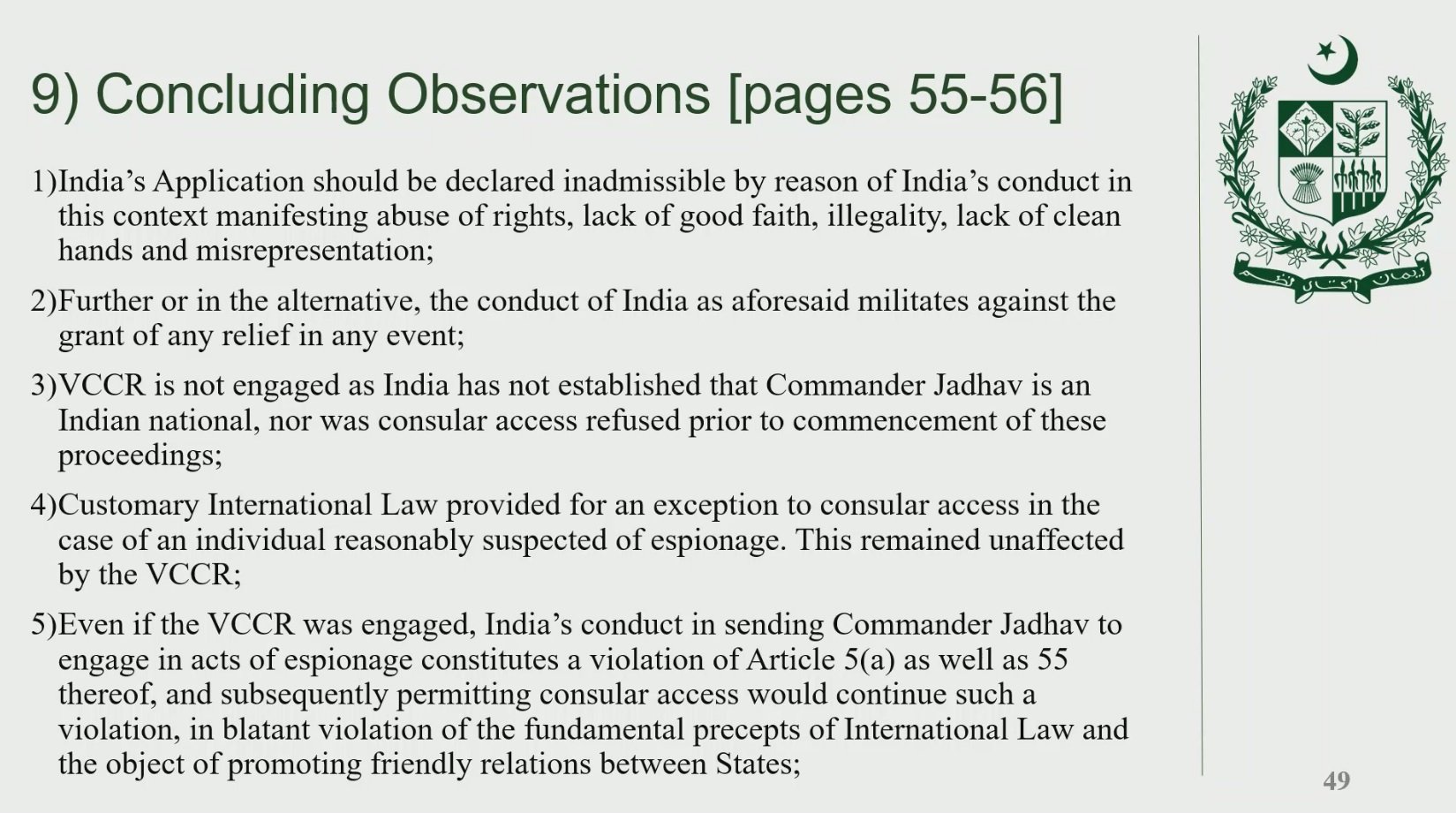THE HAGUE: Pakistan is currently presenting its arguments before the International Court of Justice (ICJ) in the case pertaining to Indian spy Kulbhushan Jadhav.
ICJ is hearing Pakistan’s arguments today (Tuesday) after India presented its side on Monday.
As the UN court, formally known as the ICJ, resumed the hearing today Pakistan submitted a request for the appointment of a new judge as ad hoc judge Tasadduq Hussain Jilani fell ill a day earlier. ICJ allowed Pakistan to present its arguments without the ad hoc judge.
Presenting arguments of the Pakistan side, English Queen’s Counsel Khawar Qureshi pointed out, “On Monday, India did not respond to several key questions.”
Stating that “a decision regarding Jadhav’s nationality has not yet been made”, Qureshi said, “India did not state whether he is Kulbushan Jadhav or Hussain Mubarak Patel.”
“How can India demand consular access when it did not confirm Jadhav’s nationality?” he questioned. “India should tell why the consular access agreement does not apply to Jadhav.”
Pakistan’s counsel said that India knew that if it comes to the issue of consular access then it would have to cooperate with Pakistan. “Which is why India directly approached the ICJ,” he added.
“On one side, India has moved the world court and on the other side it has refused to answer Pakistan’s questions,” Qureshi said. “India is sitting on a weak wall of lies just like Humpty Dumpty,” he added.
Qureshi continued, “I have represented India in the past and this attitude of India is completely new for me.”
“India levelled a baseless allegation against Pakistan of violating international laws,” the counsel maintained. “India’s claim of Jadhav retiring at the age of 47 is beyond comprehension.”
He further said, “As per the Vienna Convention, there is a forum to move the high court in the case.”
India’s spy agency Research and Analysis Wing (RAW) began to destabilise Balochistan when [Narendra] Modi came into power, he continued. “What investigation did India carry out after Jadhav was arrested from Iran?” he further asked.
Questioning why “Jadhav was in possession of a passport in the name of a Muslim”, Qureshi asked, “What evidence is there of the allegation that Jadhav was kidnapped from Iran and brought to Pakistan?”
“What evidence does India have of the nine-hour trip between Iran and Pakistan?” he further asked.
The counsel continued, “A passport in the name of Hussain Mubarak Patel was issued in 2003 and renewed in 2014. The address mentioned on the passport is that of the property owned by Jadhav’s mother.”
He clarified, “Iran has nothing to do with the Jadhav case. Jadhav was arrested from Balochistan and not Iran and the story regarding his kidnapping from Iran is baseless.”
Qureshi also gave an electronic presentation in the world court and presented excerpts from Indian journalists’ Karan Thapar and Parween Swami’s reports published in April 2017 and January 2018.
Referring to India’s National Security Adviser Ajit Doval’s interview, Qureshi said, “Doval confessed to Indian-sponsored terrorism in Balochistan during his interview.”
“According to Doval, Jadhav played a key role in terrorism in Balochistan,” he added.

India on Monday asked the ICJ to order the release of Jadhav. However, according to diplomatic sources, India has not provided evidence regarding Jadhav’s retirement.
“India did not give a satisfactory response to a question on the passport issued in Hussain Mubarak Patel’s name,” the sources added. “Jadhav had used the passport in the name of Hussain Mubarak Patel to visit India 17 times,” they added.
Pakistan’s delegation led by Attorney General Anwar Mansoor will make its closing submissions on Thursday. It is expected that the ICJ decision will be delivered by summer this year.
The hearings
The hearings revolve around the case of Kulbhushan Jadhav, an on-duty Indian navy officer working for the Indian covert agency Research & Analysis Wing (RAW). Jadhav was captured from Balochistan in March 2016. He later confessed to his association with RAW, and involvement in espionage and fomenting terrorism in Pakistan.
The Indian spy was tried in a Pakistani military court, which sentenced him to death in April 2017 for espionage and subversive activities.
Hearings in the case, which will run for four days, come at a time of intense tension between the nuclear-armed neighbours, as India has blamed Pakistan for a suicide attack on a convoy in occupied Kashmir last week that killed 44 Indian paramilitary soldiers. Pakistan has strongly rejected the allegations.
Last week, Pakistan presented a fact sheet with evidence obtained from Jadhav after his arrest and during the criminal process.
On May 18, 2018, the ICJ through an interim order stayed Jadhav’s execution until a final decision in the proceedings.








